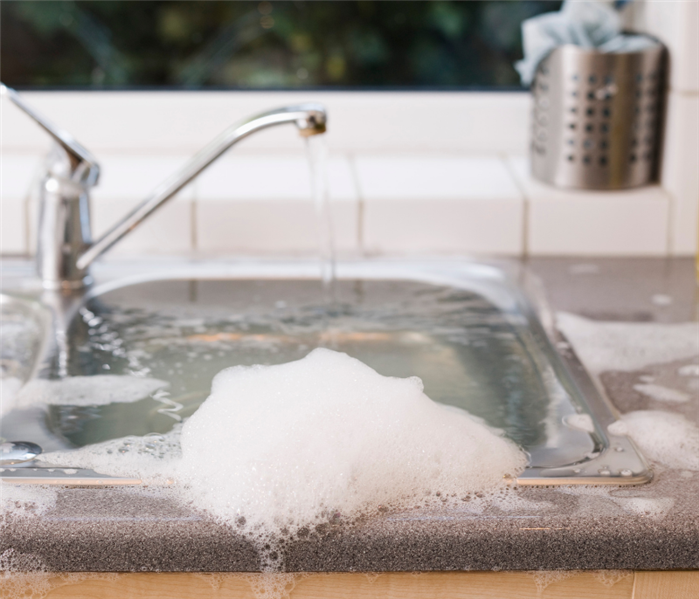What To Do When A Sink Overflows
10/28/2020 (Permalink)
When your kitchen sink overflows, it can create much more than a wet mess in your home. When unnoticed, they can cause extensive flooding, water damage, and even mold growth in your home. Even when caught early, homeowners don't always take all the necessary steps to properly clean up water. Here, we will go over what you should do if a sink overflows and how you can prevent it from happening again in the future.
Steps To Take For A Sink Overflow
- Stop the overflow. Hopefully this is as simple as turning the water off.
- Cleanup standing water. Grab towels, mops, and buckets. If you have a wet-dry vacuum, it may be helpful to use.
- Set up fans and dehumidifiers. This will help ensure the area dries and helps prevent the likelihood of mold forming.
- Grab a bucket or bowl. Use it to get as much water as you can out of your sink. Pour it outside or in a working sink.
- Fix the cause of the issue. You will likely have to call a plumber or follow the tips later in this article.
- Call your insurance company. If you aren't able to clean up the water yourself or there has been a lot of damages, you will want to file a claim.
- Call a water damage restoration company. These companies work directly with your insurance company to ensure your home is completely and properly dried out. These companies are highly important when water has made its way under tiles or hardwood and down to the subfloor.
What's The Cause of Overflows?
Whether you have an overflow in a kitchen or bathroom sink, the cause is almost always due to a clogged drain. When the water is left accidentally running or your kids were playing with the water when they shouldn't, it causes the sink to overflow.
The best way to prevent sink overflows is to make sure that their drains stay clear of clogs. When you need to unclog a drain, try the following:
- Check if the garbage disposal can end the clog. If you turn it on and the sink begins to drain, you're good to go.
- Try and use a plunger like you would on a toilet.
- Use boiling water. Pour it directly into the drain in a steady stream. If doesn't unclog, wait a few minutes and then try again.
- Pour one cup of baking soda down the drain and then one cup of white vinegar. Put a stopper over the drain opening and wait 15 minutes for the mixture to unclog the drain. Take off the cover and then run hot water to clear the clog.
- Drain-o, or other similar chemical products.
- Call a plumber.
Prevent Sink Overflows
Since overflows occur due to clogged drains, you will want to take steps to prevent clogs from forming. You can avoid clogs by doing the following:
- Make sure overflow drains are clear in case of a clog.
- Don't put food scraps down the drain unless its through the garbage disposal.
- Avoid getting hair in the sink. Over time it may accumulate into a ball in the pipe.
- Put a strainer on the drain opening to catch larger pieces of food.
- Don't put grease down the drain.
- Don't let kids play in the sink.
Need Help With Water Damage? Call SERVPRO - 800-734-3213
SERVPRO of Morristown is a 24/7 damage restoration company specializing in fire, water, mold and COVID-19 services. Whatever the disaster, make it "Like it never even happened."



 24/7 Emergency Service
24/7 Emergency Service
